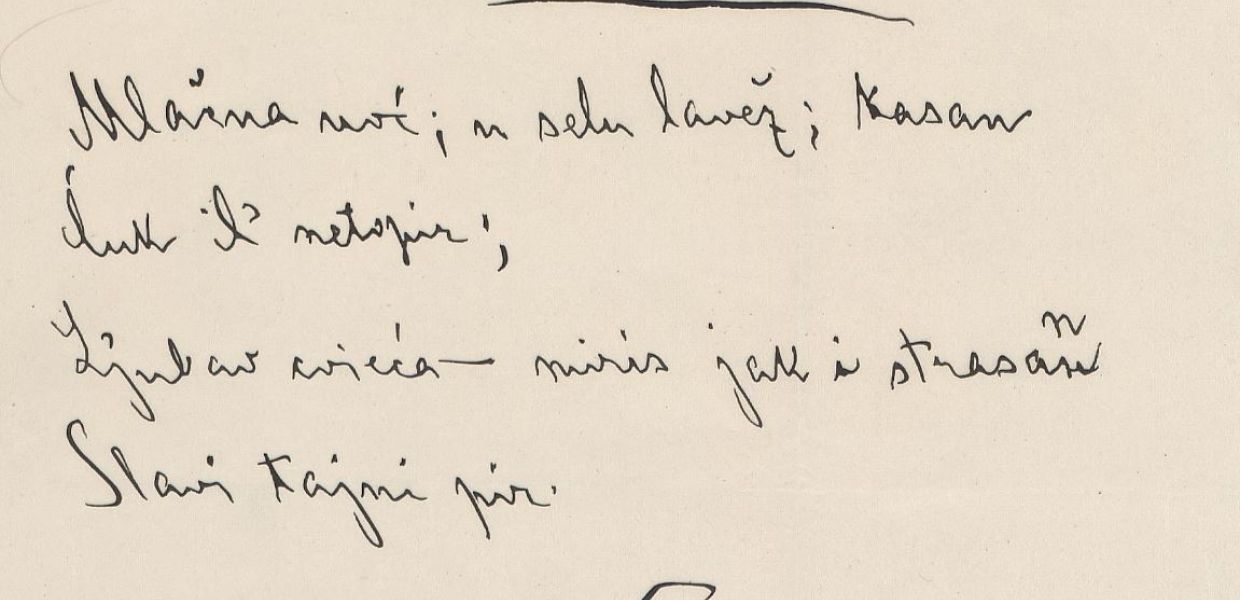Digitising our literary heritage: The Antun Gustav Matoš collection (1873-1914)

- Title:
- Nokturno
- Creator:
- Matoš, Antun Gustav (13.6.1873.–17.3.1914.)
- Date:
- 1914?
- Institution:
- National and University Library in Zagreb
- Country:
- Croatia
- Copyright:
- Public Domain
The literary bequest of Antun Gustav Matoš (Tovarnik, June 13th 1873 – Zagreb, March 17th 1914), is kept at the Archives of the Department for the History of Croatian Literature of the Institute for the History of Croatian Literature, Theatre and Music within the Croatian Academy of Sciences and Arts in Zagreb, Croatia. It is among the largest out of approximately 200 deposited collections there. Matoš was one of the greatest and most productive writers from the period of Croatian literary modernism, and is generally seen as one of the most significant Croatian writers.
The majority of Matoš' bequest was housed at the archives of the then Institute for Literature during the 1950s, and was composed of donations and acquisitions. The collection includes around 900 scanned objects (approximately 5,000 pages), highlighting the most important and interesting parts of the bequest, such as Matoš' autographs and typescripts with author's proofreading marks of his own poems (especially sonnets), short prose, feuilletons, essays, epigrams, travel writings, and cultural, theatre, and literary criticism. The collection also covers press clippings, photographs of the author, his family, friends and acquaintances, his personal documents, visiting cards, and correspondence between Matoš and his family members. It further includes a variety of documents relating to prominent people in the cultural sphere at the turn of the 19th century and in the first decades of the 20th century.
After deserting the army, Matoš lived in Belgrade, Vienna, Munich, Geneva, and finally, from 1899 to 1904, in Paris. Following his return to Zagreb, he lived as a bohemian and a professional writer, surrounded by a circle of younger poets, disciples and admirers, such as Ljubo Wiesner, Tin Ujević, Krešimir Kovačić, and Nikola Polić.
Reflections of Matoš' interest in Charles Baudelaire, Paul Verlaine, and Edgar Allan Poe, symbolism, and other phenomena in European literature of the period, as well as of the romanticist tradition, are evident in his poetic works. The collection therefore offers an insight into the literary and cultural world of the fin de siècle, not only in Croatia, but also in the wider context of European modernist literature.
The objects in this collection were scanned in 2008 by the digital studio Novena d.o.o., financed by the 'Antun Gustav Matoš Society' from the writer's hometown of Tovarnik, and by the Department for the History of Croatian Literature’s staff, who also provided the metadata, thus completing the digitisation project. If researchers should have any problems with reading textual material scans – autographs and manuscripts, they can rely on Matoš' complete works (Sabrana djela Antuna Gustava Matoša, acronym SD), published in 1973 by the Croatian Academy of Sciences and Arts in 20 volumes, since all the archival materials found in the bequest were used as a basis for this edition.
Written by Ana Batinić, PhD, the Department for the History of Croatian Literature of the Institute for the History of Croatian Literature, Theatre and Music; the Croatian Academy of Sciences and Arts (HAZU).
email: abatinic@hazu.hr
